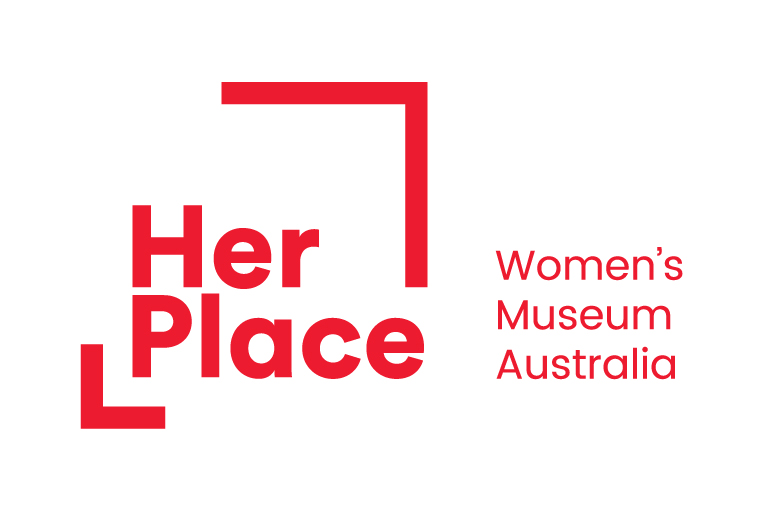FINDING HER - DIGITAL COMMEMORATIVE TOUR PUTS WOMEN ON THE MAP
FINDING HER

Australia’s first interactive state-wide digital map spotlighting women’s commemoration, FINDINGHER at HerPlace Museum has recently been launched at Her Place Women’s Museum.
A ground-breaking project, Finding Her is a virtual and physical tour using QR codes and an interactive map directing you to names and places of outstanding women.
You’ll discover the stories behind the names, including videos and photographs of women activists, pioneers of industry and significant contributors to Victorian public life.
Finding Her is just one part of Put Her Name On It, a project aimed at making women’s stories, lives and achievements visible.
A collaboration between HerPlace Women’s Museum, Gender Equity Victoria, Just Gold and the Victorian Government’s Geographic Names Victoria, Finding Her enables people living in and visiting Victoria to follow the Finding Her Trail of statues, significant places and public art installations that celebrate the achievements of Victorian women.
“Women and gender diverse people have made a significant contribution to Victoria, in politics, science, community, the arts, business and sport.
But it’s not always been easy to find a street name or a statue that records the achievements of women. Now, with the launch of Finding Her, we’re changing all of that,” said the Honourable Mary Delahunty, Chair of HerPlace Women’s Museum.
Finding Her includes directions to the new Stella Young Remembered Statue, a seat for suffragist Vida Goldstein in Portland, a statue for philanthropist Dame Elisabeth Murdoch at Frankston Art Centre and a statue for Kurnai matriarch of Gippsland, Kitty Johnson (also known as Youwali or Kitty of Cunningham).
These are just a few of the stories of the 60 plus women identified across 35 sites.
“Increasing gender equal representation and recognition is an important part of our work to create safe and respectful spaces for all. Finding Her is about making visible the full diversity of our society in our public spaces. It’s a project for gender equity and reminds everyone that our community is shaped by people of all genders.,” said Julie Kun, Chair of GENVIC.
Finding Her has been supported with dedicated funding and commitment to gender equity and commemorative justice by Geographic Names Victoria and the Victorian Government.
“We are lucky to have a Gender Equality Act in Victoria, making projects like this possible,” said Ms Delahunty, “We can get out and visit sites in our hometowns and tourists can be drawn to another innovative trail of significant historic, cultural and public art sites.
We also invite schools to use this map in history classes.”
This is just the beginning.
The digital map is designed to be updated as new sites of significance are created. Community groups, local councils, historical societies and anyone with an interesting story to share of women’s achievements in Victoria can apply for inclusion on the Finding Her Map through the website.
THE FINDING HER LAUNCH
On March 28, 2023 Her Place Women’s Museum Hosted the launch of the first phase of www.findingher.org.au
Our guests included valued Government Partners, families and descendants, authors, researchers, advocates and organisations working together to Honour Victorian Women’s Stories.
We invite you to scroll through some gorgeous moments from the Finding Her Launch captured by Damien Vincenzi
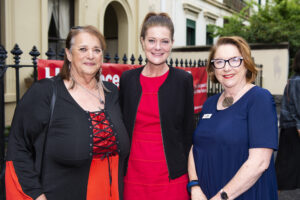
Left to Right – Barbara Burns, The Hon. Sonya Kilkenny, The Hon. Mary Delahunty G.A.I.C.D Her Place Chair
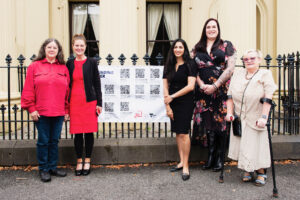
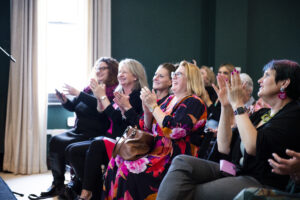
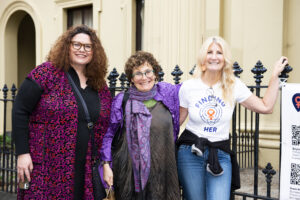
If you wish to assist this project and other Her Place projects that give visibility and voice to those who most need it, every small contribution is appreciated:
